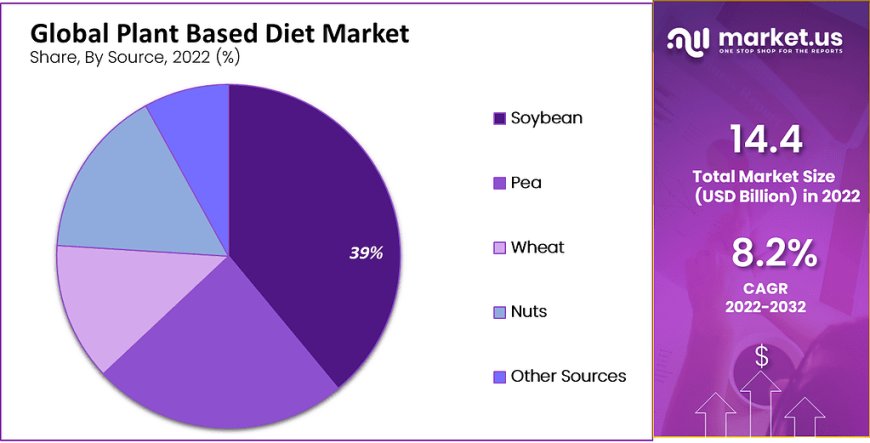Plant-Based Diet Market Flourishes: A Trend Here to Stay
Global Plant Based Diet Market size is expected to be worth around USD 31.1 billion by 2032 from USD 14.4 Billion in 2023, growing at a CAGR of 8.2%

Global Plant Based Diet Market size is expected to be worth around USD 31.1 billion by 2032 from USD 14.4 Billion in 2023, growing at a CAGR of 8.2% From 2023 to 2032.
The plant-based diet market refers to the economic sector focused on producing and selling food products derived from plants. This includes fruits, vegetables, grains, nuts, seeds, and legumes, as well as plant-based alternatives to meat and dairy products. The market caters to consumers seeking to reduce or eliminate animal products from their diet for health, ethical, or environmental reasons.

Growing consumer awareness about health benefits, animal welfare, and sustainability drives the plant-based diet market. Innovations in food technology have enabled the creation of plant-based products that mimic the taste and texture of meat and dairy, attracting a broader audience beyond vegetarians and vegans.
This market encompasses a wide range of products, including plant-based meats, dairy alternatives like almond milk and soy yogurt, and ready-to-eat meals. Major food companies and startups alike are investing in this sector, leading to rapid growth and diversification. As a result, the plant-based diet market is becoming a significant player in the global food industry.
Key Market Segments
Type
Dairy Substitute
Meat Substitute
Egg Substitute
Seafood Substitute
Other Types
Source
Soybean
Nuts
Wheat
Pea
Other Sources
Distribution Channel
Offline Sales Channel
Online Sales Channel
Category
Organic
Conventional
Download a sample report in MINUTES@ https://market.us/report/plant-based-diet-market/request-sample/
The plant-based diet market includes various types such as dairy, egg, meat, and seafood substitutes, with dairy substitutes leading in revenue share. Based on sources, the market is categorized into nuts, peas, wheat, soybean, and others, with soybean products dominating due to their availability and low cost. Distribution channels are split into offline and online, with offline channels leading in sales. The market also includes organic and conventional categories, with the organic segment ahead of the conventional.
Top Key Players
Amy’s Kitchen Inc
Danone S.A.
Atlantic Natural Foods LLC
NOW Foods
Beyond Meat Inc
Impossible Foods Inc
Nestle S.A.
RiceBran Technologies
Garden Protein International Inc
bite Food Ltd
Premier Nutrition Corporation
Other Key Players
Driver:Increasing environmental awareness and changing food habits are key drivers of the plant-based diet market. The rising number of lactose-intolerant individuals is also a significant factor, as they widely adopt plant-based alternatives that provide similar nutrients to animal-based products. Efforts by companies to develop plant-based foods that mimic the taste and flavor of animal products further drive market growth.
Restraint:High costs and taste differences between plant-based and animal-based foods remain major restraints. Many consumers prefer the taste and flavor of animal products, which are often not replicated in plant-based alternatives. Additionally, the higher prices of plant-based foods, especially those labeled as organic or vegan, limit their accessibility and adoption.
Opportunity:The increasing number of lactose-intolerant individuals and growing environmental awareness create significant opportunities. New players can enter the market to meet the demand for lactose-free, plant-based products. Major companies focusing on developing plant-based foods with similar taste and flavor to animal products also present lucrative opportunities. The shift towards reducing carbon footprints by adopting plant-based diets further enhances market potential.
Challenge:Overcoming consumer reluctance due to taste preferences and addressing the high cost of plant-based foods are major challenges. Companies need to innovate to improve the taste and affordability of their products. Additionally, tackling allergies to plant-based proteins and ensuring these alternatives provide adequate nutrition are essential challenges the industry must address to expand its consumer base.












